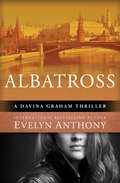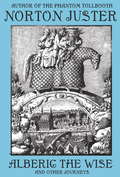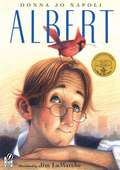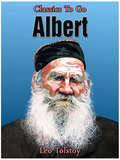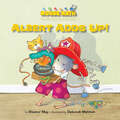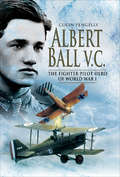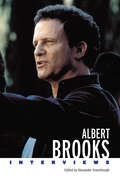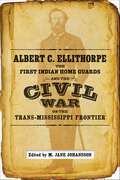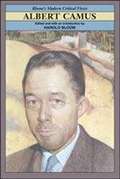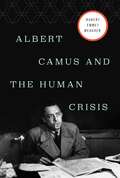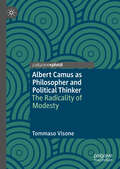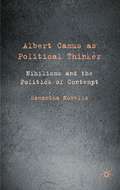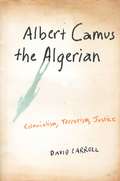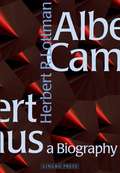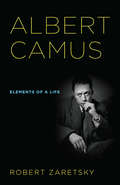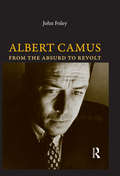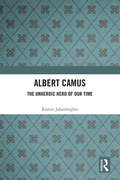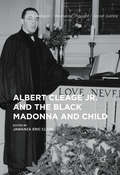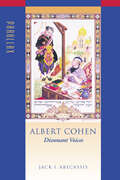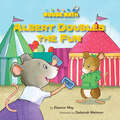- Table View
- List View
Albatross: The Defector, The Avenue Of The Dead, Albatross, And The Company Of Saints (The Davina Graham Thrillers #3)
by Evelyn AnthonyCan Davina Graham uncover the traitor in Britain's Secret Intelligence Service before it's too late? Britain's Secret Intelligence Service has been compromised: A mole high in their ranks has been feeding national secrets to the Soviets. Undercover at a prominent ad agency, SIS agent Davina Graham has been tasked with the unenviable job of uncovering the traitor, who goes by the code name Albatross. Could it be Davina's boss, Brigadier Sir James White, a twenty-year SIS veteran, months away from retirement? Humphrey Grant, White's second-in-command, whose public persona conceals damning sexual secrets? Or John Kidson, the technocrat married to Davina's beautiful, pampered sister? Further complicating matters is the fact that, in Moscow, a longtime nemesis is pulling strings behind the scenes, setting up false trails as he vows to destroy Britain and make Russia the supreme super power--and only one woman stands in his way. Torn between two lovers--Scottish operative Colin Lomax and self-made advertising executive Tony Walden--Davina must move quickly before time runs out for them all. Albatross is the 3rd book in the Davina Graham Thrillers, but you may enjoy reading the series in any order.
Albatrosses (Nature's Children)
by Lorien KiteWhere do albatrosses live? Why do albatrosses fly in big loops? What do albatrosses eat? Find the answers to these questions, and learn much more about the physical characteristics, behavior, habitat, and lives of albatrosses. Other books in this series are available in this library.
Alberic the Wise and Other Journeys
by Norton JusterThree tales of wonder. Three quests for greatness. Three feats of imagination. Norton Juster, author of the beloved classic The Phantom Tollbooth, shares spellbinding stories that entertain and delight. The first is of Alberic and his endless search for wisdom--will his journey satisfy him in the end? The second reveals a boy with no illusions and a princess with no kingdom. The third is the tale of the richest monarch in the world--and the poorest. What they discover is as amusing as it is unexpected. Alberic the Wise and Other Journeys is a book as rich in meaning as it is fun to read.
Albert
by Donna Jo Napoli Jim LamarcheYou never know what a new day will bring. Just ask Arthur.<P><P> Albert has always started his mornings by sticking his hand out the window to check if the weather is right for a walk.Then one day, a cardinal drops a twig in his palm. From that moment on, Albert's life is changed forever.
Albert "Jack" Stanley in Nigeria (A)
by Lena G. Goldberg Chad M. CarrThe international joint venture that successfully bid for $6 billion in contracts to build LNG trains on Nigeria's Bonny Island became entangled in a widening bribery and corruption probe triggered by an unrelated accusation against an employee of one of the JV partners. The (A) case discusses the JV's ""business as usual"" approach to doing business in the context of Nigeria's political culture and the involvement Albert ""Jack"" Stanley, the JV's alleged manager, in structuring and implementing an elaborate bribery scheme. The ""B"" case relates Stanley's actions after he became the subject of multiple investigations and was terminated by Halliburton, parent of the U.S. JV partner, for taking kickbacks. The ""C"" case details the resolution of bribery and corruption allegations against Stanley, several of his associates and the JV partners.
Albert "Jack" Stanley in Nigeria (B)
by Lena G. Goldberg Chad M. CarrThe case describes Albert "Jack" Stanley's response to actions initiated against him by the U.S. Department of Justice and the SEC.
Albert "Jack" Stanley in Nigeria (C)
by Lena G. Goldberg Annelena LobbThe international joint venture that successfully bid for $6 billion in contracts to build LNG trains on Nigeria's Bonny Island became entangled in a widening bribery and corruption probe triggered by an unrelated accusation against an employee of one of the JV partners. The (A) case discusses the JV's "business as usual" approach to doing business in the context of Nigeria's political culture and the involvement of Albert "Jack" Stanley, the JV's alleged manager, in structuring and implementing an elaborate bribery scheme. The "B" case relates Stanley's actions after he became the subject of multiple investigations and was terminated by Halliburton, parent of the U.S. JV partner, for taking kickbacks. The "C" case details the resolution of bribery and corruption allegations against Stanley, several of his associates and the JV partners.
Albert "Jack" Stanley in Nigeria (C)
by Lena G. Goldberg Annelena LobbThe international joint venture that successfully bid for $6 billion in contracts to build LNG trains on Nigeria's Bonny Island became entangled in a widening bribery and corruption probe triggered by an unrelated accusation against an employee of one of the JV partners. The (A) case discusses the JV's "business as usual" approach to doing business in the context of Nigeria's political culture and the involvement of Albert "Jack" Stanley, the JV's alleged manager, in structuring and implementing an elaborate bribery scheme. The (B) case relates Stanley's actions after he became the subject of multiple investigations and was terminated by Halliburton, parent of the U.S. JV partner, for taking kickbacks. The (C) case details the resolution of bribery and corruption allegations against Stanley, several of his associates and the JV partners.
Albert (Classics To Go)
by Leo Tolstoy"Albert" is a short story by Leo Tolstoy. It was originally published in 1858. The lead character, Albert, is a homeless, yet brilliant, violinist. The kind Delesov wanted to save the young violinist, but after taking him home, discovers that Albert's drinking and temper threaten to destroy his entire family.
Albert Adds Up!: Adding/taking Away (Mouse Math)
by Eleanor MayEach read-aloud book in the Mouse Math series focuses on a single, basic math concept and features adorable mice, Albert and Wanda, who live in a People House. Entertaining fiction stories capture kids&’ imaginations as the mice learn about numbers, shapes, sizes and more. Over 3 million copies sold worldwide!Wanda has brought home an awesome new book from the library—and Albert would trade anything for it! But will adding toy after toy get him any closer to the book? Every Mouse Math title includes back matter activities that support and extend reading comprehension and math skills, plus free online activities. (Math concept: Simple Addition/Subtraction)
Albert Ball VC: The Fighter Pilot Hero of World War I
by Colin PengellyAn action-packed military biography of a British fighter pilot and his rise through ranks during World War I. World War I pilot Albert Ball&’s invincible courage and determination made him a legend not only in Britain but also amongst his enemies, to whom the sight of his lone Nieuport Scout brought fear. Ball enlisted in the British army in 1914 with the 2/7th Battalion (Robin Hoods) of the Sherwood Foresters, Notts, and Derby Regiment. By October, 1914, he had reached the rank of Sergeant and then became Second-Lieutenant to his own battalion in the same month. In June, 1915, he trained as a pilot in Hendon. Then in October, he obtained Royal Aero Club Certificate and was transferred to the Royal Flying Corps. He further trained at Norwich and Upavon, being awarded the pilot&’s brevet in January, 1916. In May, he opened his score, shooting down an Albatros C-type over Beaumont. Days later he shot down two LVG C-types, while flying his Nieuport 5173. Captain Albert Ball made his final flight on May 7, 1917, when he flew as part of an eleven-strong hunting patrol into action against Jagdstaffel 11, led by Lothar Von Richthofen. Albert was pursuing the Albatros Scout of Lothar, who crash-landed, wounded. Then many witnessed Albert dive out of a cloud and crash. He died minutes later in the arms of a French girl, Madame Cecille Deloffre. Ball rose from obscurity to the top rank of contemporary fighter pilots in only 15 months. In that period, he had been awarded the MC, DSO, and two Bars, and was credited with at least 44 victories.
Albert Brooks: Interviews (Conversations with Filmmakers Series)
by Alexander GreenhoughAlbert Brooks: Interviews brings together fourteen profiles of and conversations with Brooks (b. 1947), in which he contemplates, expounds upon, and hilariously jokes about the connections between his show business upbringing, an ambivalence about the film industry, the nature of fame and success, and the meaning and purpose of comedy. Throughout all these encounters, Brooks expresses an unwavering commitment to his own artistic expression as a filmmaker and a rejection of mainstream conventions. With his questioning and critical disposition, nothing seems certain for Albert Brooks except for the integrity of art and the necessity for a wry skepticism about the incongruities of everyday life in corporate America. Brooks is neither a Hollywood insider nor an outsider. He’s somewhere in-between. Since the early 1970s, this inimitable actor-writer-director has incisively satirized the mass media system from within. After initial work as an inventive comedian, both live and on network television, Brooks contributed six shorts to the first season of Saturday Night Live, which earned him a cult following for their avant-garde form and sensibility. These were followed by his feature debut, Real Life, the first of only seven films—including Modern Romance, Lost in America, and Defending Your Life—that Brooks has directed to date. His limited output reflects not only the difficulty in financing idiosyncratic films, but equally the exacting seriousness which Brooks has in making audiences laugh and think at the same time.
Albert C. Ellithorpe, the First Indian Home Guards, and the Civil War on the Trans-Mississippi Frontier
by M. Jane JohanssonThe Civil War experiences of Albert C. Ellithorpe, a Caucasian Union Army officer commanding the tri-racial First Indian Home Guards, illuminate remarkable and understudied facets of campaigning west of the Mississippi River. Major Ellithorpe’s unit—comprised primarily of refugee Muscogee Creek and Seminole Indians and African Americans who served as interpreters—fought principally in Arkansas and Indian Territory, isolated from the larger currents of the Civil War. Using Ellithorpe’s journal and his series of Chicago Evening Journal articles as her main sources, M. Jane Johansson unravels this exceptional account, providing one of the fullest examinations available on a mixed-race Union regiment serving in the border region of the West.Ellithorpe's insightful observations on Indians and civilians as well as the war in the trans-Mississippi theater provide a rare glimpse into a largely forgotten aspect of the conflict. He wrote extensively about the role of Indian troops, who served primarily as scouts and skirmishers, and on the nature of guerrilla warfare in the West. Ellithorpe also exposed internal problems in his regiment; some of his most dramatic entries concern his own charges against Caucasian officers, one of whom allegedly stole money from the unit's African American interpreters. Compiled here for the first time, Ellithorpe’s commentary on the war adds a new chapter to our understanding of America’s most complicated and tragic conflict.
Albert Camus and the Human Crisis
by Robert E. MeagherA renowned scholar investigates the "human crisis&” that Albert Camus confronted in his world and in ours, producing a brilliant study of Camus&’s life and influence for those readers who, in Camus's words, &“cannot live without dialogue and friendship.&”As France—and all of the world—was emerging from the depths of World War II, Camus summed up what he saw as "the human crisis&”: We gasp for air among people who believe they are absolutely right, whether it be in their machines or their ideas. And for all who cannot live without dialogue and the friendship of other human beings, this silence is the end of the world. In the years after he wrote these words, until his death fourteen years later, Camus labored to address this crisis, arguing for dialogue, understanding, clarity, and truth. When he sailed to New York, in March 1946—for his first and only visit to the United States—he found an ebullient nation celebrating victory. Camus warned against the common postwar complacency that took false comfort in the fact that Hitler was dead and the Third Reich had fallen. Yes, the serpentine beast was dead, but &“we know perfectly well,&” he argued, &“that the venom is not gone, that each of us carries it in our own hearts.&” All around him in the postwar world, Camus saw disheartening evidence of a global community revealing a heightened indifference to a number of societal ills. It is the same indifference to human suffering that we see all around, and within ourselves, today. Camus&’s voice speaks like few others to the heart of an affliction that infects our country and our world, a world divided against itself. His generation called him &“the conscience of Europe.&” That same voice speaks to us and our world today with a moral integrity and eloquence so sorely lacking in the public arena. Few authors, sixty years after their deaths, have more avid readers, across more continents, than Albert Camus. Camus has never been a trend, a fad, or just a good read. He was always and still is a companion, a guide, a challenge, and a light in darkened times. This keenly insightful story of an intellectual is an ideal volume for those readers who are first discovering Camus, as well as a penetrating exploration of the author for all those who imagine they have already plumbed Camus&’ depths—a supremely timely book on an author whose time has come once again.
Albert Camus as Philosopher and Political Thinker: The Radicality of Modesty
by Tommaso VisoneThis book explores the role of modesty in the thought of Albert Camus. Camusian modesty – modestie – affirms, against nihilism and absolutism, the necessity of taking care and putting passion into the relativity of human creation and recreation. The book shows how this care and passion spring from the necessity of a continually renewed tension between the self and the limits which transcend the self. From this standpoint, modesty is not a form of moderation; it goes to the root of human condition in face of the absurd. It is a radical attitude which engages human life in a daily struggle for meaning. With modesty in mind, Camus reimagined the relation between meaning and absurdity, history and nature, self and other, nation state and continent, global north and south, and war and peace. In a world of arrogance, narcissism, and fear, Camus’ philosophical and political insights are fundamental in order to re-think and re-imagine our present.
Albert Camus as Political Thinker
by Samantha NovelloAn intense genealogical reconstruction of Camus's political thinking challenging the philosophical import of his writings as providing an alternative, aesthetic understanding of politics, political action and freedom outside and against the nihilistic categories of modern political philosophy and the contemporary politics of contempt and terrorisms
Albert Camus the Algerian: Colonialism, Terrorism, Justice
by David CarrollIn these original readings of Albert Camus' novels, short stories, and political essays, David Carroll concentrates on Camus' conflicted relationship with his Algerian background and finds important critical insights into questions of justice, the effects of colonial oppression, and the deadly cycle of terrorism and counterterrorism that characterized the Algerian War and continues to surface in the devastation of postcolonial wars today. During France's "dirty war" in Algeria, Camus called for an end to the violence perpetrated against civilians by both France and the Algerian National Liberation Front (FLN) and supported the creation of a postcolonial, multicultural, and democratic Algeria. His position was rejected by most of his contemporaries on the Left and has, ironically, earned him the title of colonialist sympathizer as well as the scorn of important postcolonial critics. Carroll rescues Camus' work from such criticism by emphasizing the Algerian dimensions of his literary and philosophical texts and by highlighting in his novels and short stories his understanding of both the injustice of colonialism and the tragic nature of Algeria's struggle for independence. <P><P>By refusing to accept that the sacrifice of innocent human lives can ever be justified, even in the pursuit of noble political goals, and by rejecting simple, ideological binaries (West vs. East, Christian vs. Muslim, "us" vs. "them," good vs. evil), Camus' work offers an alternative to the stark choices that characterized his troubled times and continue to define our own. "What they didn't like, was the Algerian, in him," Camus wrote of his fictional double in The First Man. Not only should "the Algerian" in Camus be "liked," Carroll argues, but the Algerian dimensions of his literary and political texts constitute a crucial part of their continuing interest. Carroll's reading also shows why Camus' critical perspective has much to contribute to contemporary debates stemming from the global "war on terror."
Albert Camus: A Biography
by Herbert R. LottmanWhen Albert Camus died in a car crash in January 1960 he was only 46 years old - already a winner of the Nobel Prize for Literature and a world figure - author of the enigmatic The Stranger, the fable called The Plague, but also of the combative The Rebel - which attacked the 'politically correct' among his con-temporaries.Thanks to his early literary achievement, his work for the under-ground newspaper Combat and his editorship of that daily in its Post-Liberation incarnation, Camus' voice seemed the conscience of postwar France. But it was a very personal voice that rejected the conventional wisdom, rejected ideologies that called for killing in the cause of justice. His call for personal responsibility will seem equally applicable today, when Camus' voice is silent and has not been replaced. The secrecy which surrounded Algerian-born Camus' own life, public and private - a function of illness and psychological self-defense in a Paris in which he still felt himself a stranger - seemed to make the biographer's job impossible.Lottman's Albert Camus was the first and remains the definitive biography - even in France. On publication it was hailed by New York Times reviewer John Leonard: "What emerges from Mr. Lottman's tireless devotions is a portrait of the artist, the outsider, the humanist and skeptic, that breaks the heart." In The New York Times Book Review British critic John Sturrock said: "Herbert Lottman's life (of Camus) is the first to be written, either in French or English, and it is exhaustive, a labor of love and of wonderful industry." When the book appeared in London Christopher Hitchens in New Statesman told British readers: "Lottman has written a brilliant and absorbing book... The detail and the care are extra-ordinary... Now at last we have a clear voice about the importance of liberty and the importance of being concrete."The new edition by Gingko Press includes a specially written preface by the author revealing the challenges of a biographer, of some of the problems that had to be dealt with while writing the book and after it appeared.
Albert Camus: Elements of a Life
by Robert D. ZaretskyLike many others of my generation, I first read Camus in high school. I carried him in my backpack while traveling across Europe, I carried him into (and out of) relationships, and I carried him into (and out of) difficult periods of my life. More recently, I have carried him into university classes that I have taught, coming out of them with a renewed appreciation of his art. To be sure, my idea of Camus thirty years ago scarcely resembles my idea of him today. While my admiration and attachment to his writings remain as great as they were long ago, the reasons are more complicated and critical.—Robert Zaretsky On October 16, 1957, Albert Camus was dining in a small restaurant on Paris's Left Bank when a waiter approached him with news: the radio had just announced that Camus had won the Nobel Prize for Literature. Camus insisted that a mistake had been made and that others were far more deserving of the honor than he. Yet Camus was already recognized around the world as the voice of a generation—a status he had achieved with dizzying speed. He published his first novel, The Stranger, in 1942 and emerged from the war as the spokesperson for the Resistance and, although he consistently rejected the label, for existentialism. Subsequent works of fiction (including the novels The Plague and The Fall), philosophy (notably, The Myth of Sisyphus and The Rebel), drama, and social criticism secured his literary and intellectual reputation. And then on January 4, 1960, three years after accepting the Nobel Prize, he was killed in a car accident. In a book distinguished by clarity and passion, Robert Zaretsky considers why Albert Camus mattered in his own lifetime and continues to matter today, focusing on key moments that shaped Camus's development as a writer, a public intellectual, and a man. Each chapter is devoted to a specific event: Camus's visit to Kabylia in 1939 to report on the conditions of the local Berber tribes; his decision in 1945 to sign a petition to commute the death sentence of collaborationist writer Robert Brasillach; his famous quarrel with Jean-Paul Sartre in 1952 over the nature of communism; and his silence about the war in Algeria in 1956. Both engaged and engaging, Albert Camus: Elements of a Life is a searching companion to a profoundly moral and lucid writer whose works provide a guide for those perplexed by the absurdity of the human condition and the world's resistance to meaning.
Albert Camus: From the Absurd to Revolt
by John FoleyAdopting an interdisciplinary approach, encompassing philosophy, literature, politics and history, John Foley examines the full breadth of Camus' ideas to provide a comprehensive and rigorous study of his political and philosophical thought and a significant contribution to a range of debates current in Camus research. Foley argues that the coherence of Camus' thought can best be understood through a thorough understanding of the concepts of 'the absurd' and 'revolt' as well as the relation between them. This book includes a detailed discussion of Camus' writings for the newspaper "Combat", a systematic analysis of Camus' discussion of the moral legitimacy of political violence and terrorism, a reassessment of the prevailing postcolonial critique of Camus' humanism, and a sustained analysis of Camus' most important and frequently neglected work, "L'Homme revolte" (The Rebel).
Albert Camus: The Unheroic Hero of Our Time
by Ramin JahanbeglooThis book interprets the ideas, thoughts and concepts that characterize the writings and philosophy of Albert Camus for our contemporary times. It investigates Camus’ "revolted compassion" as an outsider and a philosopher-writer who in his own words believed in "creating dangerously". The author examines Camus’ interventions on political, philosophical and moral questions, such as Algerian independence, capital punishment, ideological violence, nihilism in the context of his ideals of the absurd and revolt, and justice and liberty. Further, it goes on to provide an exhaustive analysis of Camus’ critique of violence and his intellectual resistance to totalitarianism. Bringing together latest scholarship with an acute analysis of Albert Camus’ philosophy, this sourcebook throws a powerful light on the intellectual foundations of the twentieth century and its relevance for the twenty-first. The book will be of interest to scholars of literature, philosophy and African Studies.
Albert Cleage Jr. and the Black Madonna and Child (Black Religion/Womanist Thought/Social Justice)
by Jawanza Eric ClarkIn this collection, black religious scholars and pastors whose expertise range from theology, ethics, and the psychology of religion, to preaching, religious aesthetics, and religious education, discuss the legacy of Albert B. Cleage Jr. and the idea of the Black Madonna and child. Easter Sunday, 2017 will mark the fifty year anniversary of Albert B. Cleage Jr. 's unveiling of a mural of the Black Madonna and child in his church in Detroit, Michigan. This unveiling symbolized a radical theological departure and disruption. The mural helped symbolically launch Black Christian Nationalism and influenced the Black Power movement in the United States. But fifty years later, what has been the lasting impact of this act of theological innovation? What is the legacy of Cleage's emphasis on the literal blackness of Jesus? How has the idea of a Black Madonna and child informed notions of black womanhood, motherhood? LGBTQ communities? How has Cleage's theology influenced Christian education, Africana pastoral theology, and the Black Arts Movement? The contributors to this work discuss answers to these and many more questions.
Albert Cohen: Dissonant Voices (Parallax: Re-visions of Culture and Society)
by Jack I. AbecassisHonorable Mention winner in the Modern Language Association's Aldo and Jeanne Scaglione Prize competition for French and Francophone Literary StudiesA major figure in twentieth-century letters, Albert Cohen (1895–1981) left a paradoxical legacy. His heavily autobiographical, strikingly literary, and polyphonic novels and lyrical essays are widely read by a devout public in France, yet have been largely ignored by academia. A self-consciously Jewish writer and activist, Cohen remained nevertheless ambivalent about Judaism. His self-affirmation as a Jew in juxtaposition with his satirical use of anti-Semitic stereotypes still provokes unease in both republican France and institutional Judaism.In Albert Cohen: Dissonant Voices, the first English-language study of this profound and profoundly misunderstood writer, Jack I. Abecassis traces the recurrent themes of Cohen's works. He reveals the dissonant fractures marking Cohen as a modernist, and analyzes the resistance to his work as a symptom of the will not to understand Cohen's main theme—"the catastrophe of being Jewish."For Abecassis, Cohen's diverse oeuvre forms a single "roman fleuve" exploring this perturbing theme through fragmentation and grotesquerie, fantasies and nightmares, the veiling and unveiling of the unspeakable.Abecassis argues that Cohen should not be read exclusively through the prism of European literature (Stendhal, Tolstoy, Proust), but rather as the retelling—inverting and ultimately exhausting, in the form of submerged plots—of the Biblical romances of Joseph and Esther. The romance of the charismatic Court Jew and its performance correlative, the carnival of Purim, generate the logic of Cohen's acute psychological ambivalence, historical consciousness and carnal sensuality—themes which link this modernist author to Genesis as well as to the literary practices of Sephardic crypto-Jews. Abecassis argues that Cohen's best-known work, Belle du Seigneur (1968), besides being an obvious tale of obsessive love and dissolution, is foremost a tale of political intrigue involving Solal, the meteoric-rising Jew in the League of Nations during the period of Appeasement (1936), and his ultimate self-destruction. Providing close readings and imaginative analyses of the entire literary output of one of twentieth-century France's most important Jewish writers, Abecassis presents here a major work of literary scholarship, as well as a broader study of the reception and influence of Jewish thought in French literature and philosophy.
Albert Doubles the Fun: Adding Doubles (Mouse Math)
by Eleanor MayEach read-aloud book in the Mouse Math series focuses on a single, basic math concept and features adorable mice, Albert and Wanda, who live in a People House. Entertaining fiction stories capture kids&’ imaginations as the mice learn about numbers, shapes, sizes and more. Over 3 million copies sold worldwide!Albert is going to the Mouse County Fair! But when his best friend, Leo, isn't home, Albert decides to have fun for both of them. Double the fun! Every Mouse Math title includes back matter activities that support and extend reading comprehension and math skills, plus free online activities. (Math concept: Adding doubles).
